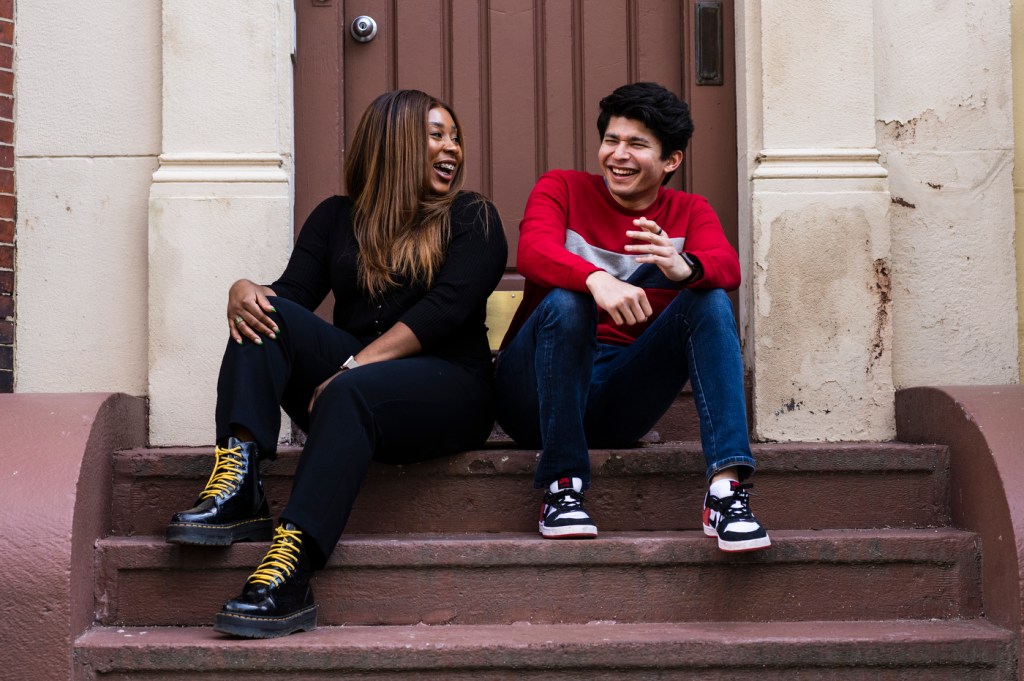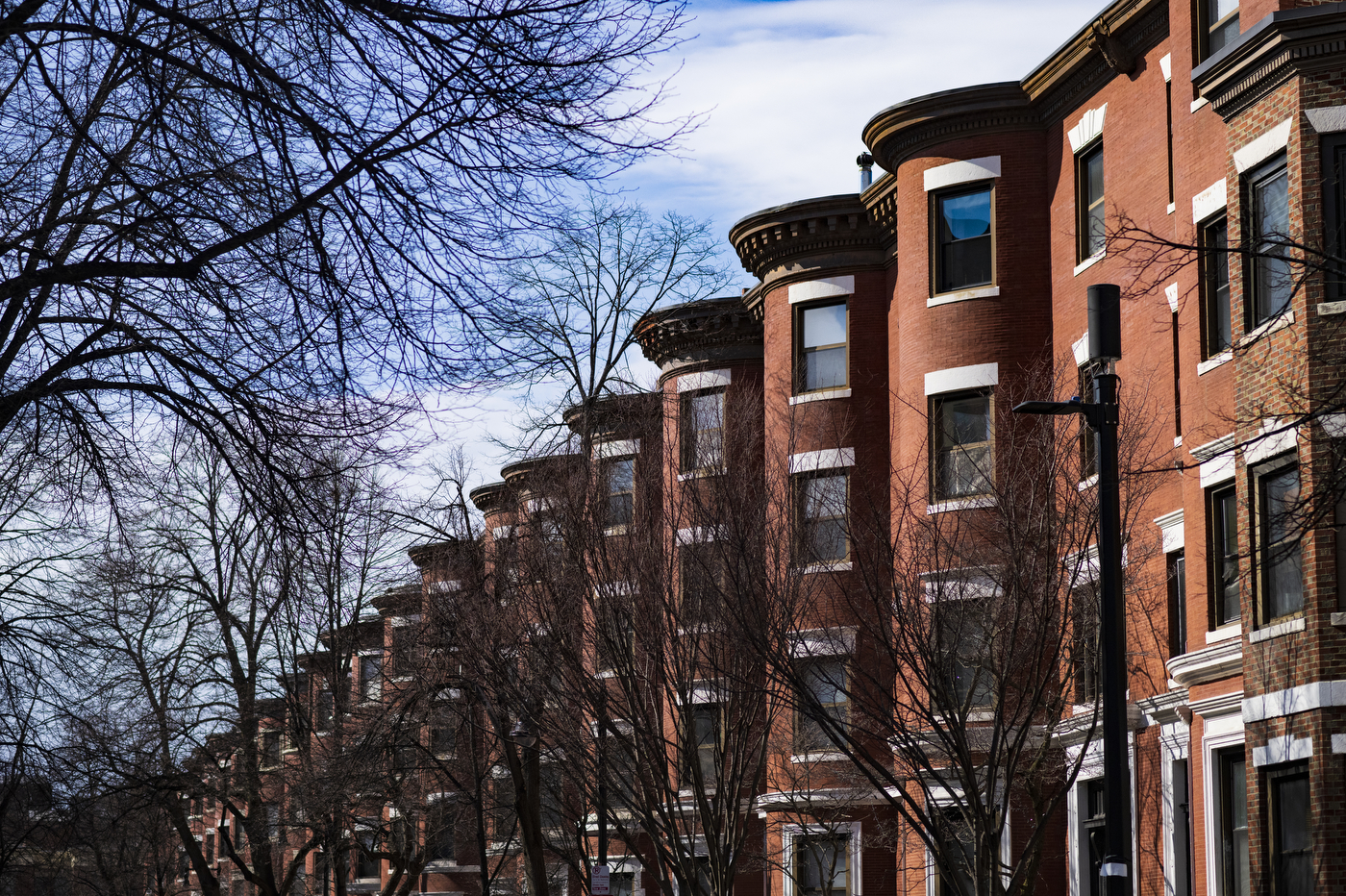Tips and tricks on how to play Boston’s real-estate market if you’re planning to live off campus

Nita Akoh, a fifth-year behavioral neuroscience student at Northeastern in Boston, always knew she wanted to live off campus, but finding the right place wasn’t easy.

An international student from Nigeria, Akoh remembers calling about 10 people a day. She toured about four and finally landed an apartment in Jamaica Plain that met her criteria and more—easy access to the T, individual bedrooms and bathrooms, a washer and dryer, and even a gym.
She’s lived there with a roommate for three years. After all, Akoh says, it would be difficult to find a similar apartment elsewhere for the same price.
“First class ruins flying for you because you can never fly economy again,” Akoh says. “The same thing with the housing situation right now.”
Finding off-campus housing can be a challenge, but it’s easier if you’ve been there and done that, says Akoh, now a community ambassador for Northeastern’s Off-Campus Engagement and Support office.
Director Mallory Pernaa says finding housing “has gotten harder.” During the pandemic, everyone moved out of the city, causing prices to drop. But now, the exact opposite is happening.
“Students are back at all universities and people are back,” Pernaa says. “It’s not just students competing with each other. There are other young professionals and renters.”
Off-Campus Engagement and Support will hold a virtual information session from 11 a.m. to 1 p.m. on Tuesday, April 11.
Here are some tips and tricks on how to play Boston’s real-estate market if you’re planning to live off campus next fall:
Start early, but not too early
Start early for next fall, but not too early, Pernaa says. November is too early because many renters haven’t told their landlords if they will re-sign their lease. By January or February, there will be more on the market.
That means start looking now for next year!
It can get tough, especially for students who begin the search in May, June, July and August. These include transfers, international students or those admitted on a rolling basis. It might be easier to look for a single room within an apartment or sublet.
Also, students must choose if they will live on campus by January, based on a lottery. Students don’t find out if they have housing until February.
Use a reputable source, not social media
Always use the Northeastern Housing database, Pernaa says. Due to cost, students often look everywhere for housing. Some go to Facebook, WhatsApp, Craiglist or Rent.com. But the problem is that there are “so many savvy scammers,” and they have no affiliation with Northeastern.
There might even be a Facebook group that says it’s a Northeastern-affiliated page when it’s not. It gives students a false sense of security, even though it’s not legitimate.
Also, using a broker is wise because apartments come and go so quickly. Many listings become outdated fast. What is listed online might already be gone.
How much should I expect to spend?
Rents are more than they were five years ago and are beginning to go past what the rents were in 2019, Pernaa says.
In the past, Pernaa would tell students to budget about $1,000 if they planned to have roommates and live near campus. Now, that has ballooned to $1,200 to $1,500, almost regardless of the neighborhood.
The most popular neighborhoods are Mission Hill and Fenway. However, there are more students in Mission Hill because of more space and bigger apartments. Downtown is prohibitive because it is expensive, but many students are moving further out into Roxbury.
Most importantly, “never give a lump sum of money without signing a lease,” says Kesia Davies, a community ambassador and a senior studying design. Brokers and landlords can ask for a small fee to hold the apartment, but don’t give the first month’s rent or security deposit before the rental agreements are signed.
Davies also advises students never to live in an apartment if they are not on the lease. Landlords must comply with rules and regulations, such as fire safety codes. If a landlord finds out an extra person is living in an apartment, those on the lease could be forced to leave without any renter’s rights.
Visit the apartment in person or send a friend
Physically go and look at a place before signing anything, Pernaa advises. If you are not in person, send a friend or have a video tour. Photos can be a couple of years old, deceptive, or don’t show the property’s current condition.
Going in person also allows students to get a feel for the neighborhood and see if it feels safe and is close to food or transportation.
“A lot can be lost in the online apartment search,” Pernaa says.
Roommates and parents must be on the same page
Getting roommates and parents on the same page “will save students a lot of heartache,” Pernaa says.
Having a plan on the budget, what kinds of amenities, and what neighborhood everyone wants to live in ahead of time will help narrow the search process and save a lot of time.
Also, if a student plans to sublet during their time renting, they should be upfront about it, allowing roommates time to find someone to replace them.
Pick your roommates by lifestyle and set boundaries
There are a lot of things that students don’t think to ask when they’re choosing roommates. For example, different schedules, the same values or even dietary restrictions can lead to conflict.
“That’s missed, I think, in the roommate selection process because of the frantic feeling that they have to find housing right away,” Pernaa said.
Davies advises students to sign a roommate agreement, an informal contract that sets up ground rules ahead of time to avoid a falling out later.
“We see a lot of students come in with conflicts within the household,” and the contract lets students navigate future conflicts with better outcomes, Davies says.
It will work out if you have patience and time
For Rythm Desai, who is pursuing a master’s in analytics from the College of Professional Studies, finding the perfect apartment was difficult. As an international student from India, he could not visit apartments in person, and he was looking late in the game because he got approval for his visa in July.
Luckily enough, he had a friend who was looking for a roommate. But then, they needed to find a guarantor to sign the lease. Rhythm had to ask his uncle to step in.
“It’s wonderful to have good roommates,” says Desai, even if his apartment is in Allston, far from Northeastern. “It’s very difficult to find these kinds of apartments.”
It’s easy, he says, if you have the patience and the time.
Desai says, going through the listings “step by step, it’s quite easy.”
Beth Treffeisen is a Northeastern Global News reporter. Email her at b.treffeisen@northeastern.edu. Follow her on Twitter @beth_treffeisen.






